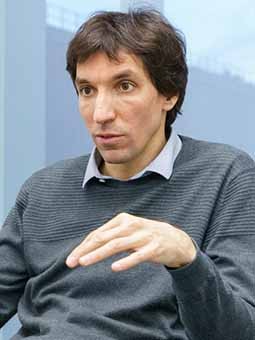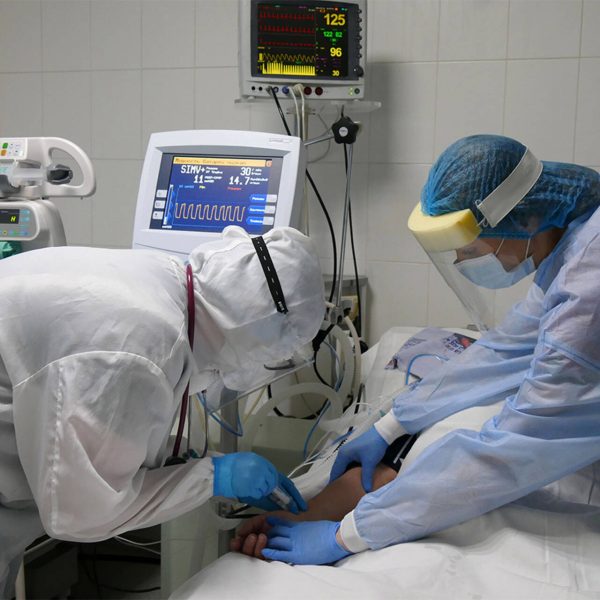 Starting from the middle of March 2021, the third wave of COVID-19 began in Europe, according to the official statement of the European Commission. The overwhelming majority of new cases are the British strain of COVID-19. “Pravmir.ru” found out whether the third wave is expected in Russia and how to protect oneself from the new strain.
Starting from the middle of March 2021, the third wave of COVID-19 began in Europe, according to the official statement of the European Commission. The overwhelming majority of new cases are the British strain of COVID-19. “Pravmir.ru” found out whether the third wave is expected in Russia and how to protect oneself from the new strain.
What is known about the British strain of coronavirus?
The British strain was identified in early December in the UK (this does not mean that this variant of the virus originated there, they only identified it in the UK). By February, the British strain was recorded in more than 100 countries, according to the W.H.O data.
In early March 2021, this type of coronavirus began to dominate Europe. Now 90 percent of new cases, for example, in Germany, are people infected with this particular strain.
Over the past few months, the number of cases in Europe has increased. Angela Merkel called the third wave the most difficult one. If in early April, according to Johns Hopkins University, from 5 to 11.3 thousand cases were detected in Germany per day, then by April 7 the figure rose to 30.3 thousand people.
In February, the UK government’s Advisory Group on Emerging Respiratory Viruses released data showing that the British strain is more likely to lead to hospitalizations and deaths in those infected – the risk of death is 1.53 times higher, especially for the group over 55 years old.
Recently there were published studies of the authoritative medical journals The Lancet Infectious Diseases and The Lancet Public Health. The authors of two studies conclude that the new strain of coronavirus does not lead to a more serious course of COVID-19. “We found no evidence of an association between the severity of the disease and the origin of the virus,” says The Lancet Infectious Diseases. However, researchers have confirmed the increased infectivity of this variant of the virus. Scientists believe existing vaccines should be effective against the British strain.
The Russian Ministry of Health spoke on the third wave of coronavirus in Russia in quite controversial ways. For example, the deputy head of the Ministry announced at the end of March that the third wave in Russia is possible. However, its leader, Minister Murashko, two days later, hurried to correct his subordinate and said that talks about the third wave in Russia were premature. Head of the Gamalei Center, Alexander Gintsburg, generally called all the forecasts of the third wave fortune-telling.
However, the new strain of the virus has almost completely captured Europe in three months and it is not clear what exactly will prevent it from spreading in our country.
In Russia, 103 cases of infection with the British strain were detected so far, said the head of Rospotrebnadzor, Anna Popova, in early April. However, an evolutionist, professor at the Skolkovo Institute of Science and Technology, Georgy Bazykin, concludes that at least 10 percent of the population in Russia is already infected with the new strain, on the basis of his calculations.
There are three barriers to the virus – vaccination, lockdown and herd immunity. In Russia, only 3.74% of the population is vaccinated. For example, in the USA this number is 22%, in Israel it is 53.82%, and in Germany it is 6.09%.
We have no lockdown. It is too early to talk about herd immunity. What will stop the British strain at the borders?
Is the Third Wave Imminent?
 “New strains appear that increase the infectiousness of the virus, its ability to spread,” says molecular virologist Georgy Bazykin. “And in all countries where new strains appeared, there was an increase in the number of infections. On the other hand, the warm season is coming – people open their windows, ventilate the premises more, spend more time outside, then the holidays will begin, and all of this reduces the likelihood of infection. And more and more people are being vaccinated. Vaccines that deal with the original coronavirus also provide good protection against B.1.1.7, the “British strain”, that is rapidly spreading in Russia.”
“New strains appear that increase the infectiousness of the virus, its ability to spread,” says molecular virologist Georgy Bazykin. “And in all countries where new strains appeared, there was an increase in the number of infections. On the other hand, the warm season is coming – people open their windows, ventilate the premises more, spend more time outside, then the holidays will begin, and all of this reduces the likelihood of infection. And more and more people are being vaccinated. Vaccines that deal with the original coronavirus also provide good protection against B.1.1.7, the “British strain”, that is rapidly spreading in Russia.”
How these factors will interact, which factor will win is difficult to predict, the virologist told Pravmir.ru.
“But if we look at the experience of other countries, I would rather expect an increase in the number of cases in Russia. I’d be glad to be wrong. In all countries where the new strain appears, the proportion of infection with it is growing rapidly. And it is known how. If in February B.1.1.7 is 1% of all cases, in March it is 10%, in April it is 50%, and in May – 90%. At what point on this curve we are now is not so important: one way or another, this or similar variants of the virus in Russia will almost certainly spread and become predominant,” Mr. Bazykin concluded.
 “Once it gets in the population, the British strain begins to spread rapidly,” explains molecular biologist Irina Yakutenko. “It happened in all European countries. We know that the borders of Russia have never been completely closed. A recent study showed that the British strain was evidently brought into the country during the pandemic too, which spreads much better than the previous variants of the virus. Accordingly, there will be a third wave, the only question is when it will begin. Probably, like last spring, this will happen with some delay in relation to Europe.”
“Once it gets in the population, the British strain begins to spread rapidly,” explains molecular biologist Irina Yakutenko. “It happened in all European countries. We know that the borders of Russia have never been completely closed. A recent study showed that the British strain was evidently brought into the country during the pandemic too, which spreads much better than the previous variants of the virus. Accordingly, there will be a third wave, the only question is when it will begin. Probably, like last spring, this will happen with some delay in relation to Europe.”
Those who have recovered from the “old” strain can become infected with the new variant of the virus, says Irina Yakutenko.
“But all recent studies show that the existing vaccines are just as effective against the British strain. It is necessary to get vaccinated as soon as possible against the background of a lockdown. Before a significant part of the population is vaccinated, it is necessary to keep a lockdown. Otherwise, the virus will simply outpace vaccination,” she said.
Will Collective Immunity Save Us?
There is an opinion that a large proportion of those who have been ill with developed immunity can somehow limit the rapid spread of the new variant of the virus in the country. It is not known exactly what percentage of Russians have been ill and have immunity. Rospotrebnadzor says the figure is 3%, and some virologists believe the figure is between 20 to 70%.
“A lot of people have been ill in Russia,” says Irina Yakutenko. “If we look at the level of antibodies, then we see that it is comparable to the African level. In Europe, the number of people who were ill [with COVID-19] is much less, as there was and still is a tough lockdown. But even if 40-50% fell ill in Russia – although, most likely, the number is less – this is not enough to stop the spread of the virus.”
“In order for the epidemic to die out by itself, it is necessary to achieve a certain level of herd immunity. What exactly this level is depends on the pathogen and, mainly, on its infectiousness. For example, in the case of the highly contagious measles virus, about 90 percent of the population needs to be vaccinated or to have been ill with it. If the number of those immunized is less, then outbreaks of measles will occur periodically. The new British strain is more infectious than the old variants of COVID-19, and accordingly, the herd immunity threshold for it is higher.”
A sharp rise in the incidence is taking place in India. If in February there were about 10 million cases in the country, now there are almost 14 millions.
“There was the same talk about India as there is about Russia: it was believed that a very large proportion of the population had already been ill and the virus would no longer spread,” comments Georgy Bazykin. “And now there is a sharp increase. The reason is not known for sure, but it seems that it happens also due to the arrival of new variants of the virus. In Manaus in Brazil [in February there were almost 10 million cases, now there are 13.5 million – Editor’s note], it was believed that 70% had immunity, but then the number of cases still began to grow rapidly. There is still a lot of unknown here, but in any case, the fact that many of us were sick with something similar to COVID-19 does not at all mean that we are all protected.”
Is the new strain not as dangerous?
The fact that the British strain is not at all as deadly as it was previously assumed should not relax our vigilance.
“Imagine there are two strains,” explains Georgy Bazykin. “Let’s say one increases mortality by 10%, and the second increases infectiousness by 10%. Which one will claim more lives? Answer: the one increasing contagiousness. Because the one that increases the lethality will take 10% more lives, and, for example, instead of 100 people, 110 will die. And the one that increases the infectiousness can lead to growth that cannot be contained, and kill 200 and 300 people instead of 100. An increase in infectiousness is more dangerous than an increase in mortality.”
Why are there so few vaccinated people in Russia?
In Europe, you have to wait a month in order to get vaccinated. We have the opposite situation. People sometimes try to get bogus vaccination certificates in order to travel abroad. There are not so many people who want to get the vaccine.
“At the very beginning, politicians did not want to believe virologists, who said that only vaccination would help to cope with the pandemic,” comments Irina Yakutenko. “It is necessary to build factories for the production of vaccines in advance, before the end of clinical trials of vaccines. This was partly done in the United States, which is why they produce a huge amount of vaccines and rapidly vaccinate the population, while Europe and Russia are lagging behind colossally. In Europe, this is primarily due to the lack of vaccines. We also do not have enough vaccines, but the main reason for the low rates of vaccination is the distrust of the population.”
This is a paradox. In Russia, where there is a vaccine, people do not want to be vaccinated.
“The rates of vaccination in our country are lagging behind even compared to Europe, in which there is not enough vaccines and many politicians are threatened with non-re-election due to the fact that vaccination is too slow. In Russia, the pace of the vaccination campaign is very slow, but nobody seems to be particularly concerned about it.”
According to Georgy Bazykin, if the rate of vaccination in our country does not accelerate, the number of cases may grow.
“I still hope for an increasing proportion of those vaccinated,” says the scientist. “Maybe people, looking at their loved ones who get vaccinated and after that live more calmly, will begin to treat the vaccine warmer. We are now seeing an increase in the incidence in many regions of the United States, although the vaccination campaign there is quite successful and intensive, but nevertheless, for example, in Michigan, there is an increase in the number of infections associated with B.1.1.7. This does not mean that the vaccine does not work – it is just that vaccination is taking place against the background of the rapid spread of a new variant of the virus among unvaccinated people. In general, vaccination works in a race against the emergence and spread of new options. The faster humanity gets vaccinated, the less chances the virus will have to evolve further. Going and getting vaccinated are the simplest and most reliable things to do now.”
What other strains are there?
Many strains of COVID-19 have appeared, but the most famous, besides the British one, are South African and Brazilian.
“How well vaccines protect against different variants of the virus is now being closely researched. The data available today show that protection against B.1.1.7 remains complete or nearly complete; against B.1.351 (South African) is apparently weakening somewhat; nothing is known about other options yet. Now both of these options are spreading in Russia, there are more cases of one, and less of the other. In terms of infectiousness they are comparable, and which of the strains “will win” is impossible to say yet.
But it is important to understand that even incomplete protection is much better than none at all,” says Georgy Bazykin.
In Russia, sequencing is very poorly established, that is, reading the genome of coronavirus. Therefore, there is no exact data on how and what strains are spreading in our country.
“The most unpleasant thing is that in Russia there are no numbers in order to build a mathematical model and understand exactly how strains spread in our country,” Irina Yakutenko comments. “Having the problem of the lack of accurate data on the spread of new strains is bad. Because without numbers it is impossible to build an adequate protection policy. It is difficult to decide whether we are opening [places] or, conversely, closing.”
“In the end, we can do nothing,” she continues. “We have gone through many viral epidemics in our lifetime. If you do nothing, everyone will get sick more or less, those who cannot survive will die, someone will have long-term consequences. But we don’t want that. If we want to save as many lives as possible, as well as to preserve the quality of life, then we need to get vaccinated as soon as possible. Because there is no other way to protect vulnerable groups and save lives.”
Are hospitals ready for the third wave?
“In Moscow, the number of new cases has been at the same level for two months now,” says Alexander Vanyukov, head of the department of X-ray surgical methods of diagnostics and treatment at Clinical Hospital No. 52. “In March there was a decrease to 1200 people a day, then it jumped back to 1800 people a day and keeps on [the same level]. It is difficult to say whether it is the third wave or not. There is a slight seasonal rise, but not as global as the first two waves.”
There are still hospitals in Russia that continue to be partially redesigned for treating coronavirus. Doctors know how to act, treatment regimens are approved.
“We do not expect that there will be some kind of explosive growth, like in the fall. In Moscow, quite a few people have been ill and some of them have got vaccinated,” continues Alexander Vanyukov. “It all depends on how accurately we predicted the capacity of the beds. Whether there are enough or not is the only limiting factor and something that can be dangerous. Thank God, we have a fairly large bed capacity. But we, of course, very much hope that people will be get vaccinated actively.”

















